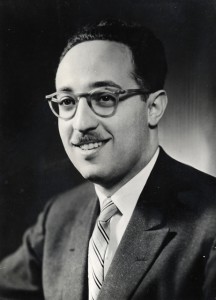Joshua Fishman (1926-2015)

Born in Philadelphia in 1926, Joshua (Shikl) Fishman was brought up by immigrant parents who were devoted to Yiddish and active members of the Workmen's Circle, in whose schools Fishman received his earliest education in Yiddish. His sister Rukhl (1935-1984) became a Yiddish poet.
While still a teenager, he befriended YIVO founder Max Weinreich, and his sons, Uriel and Gabriel, who had recently fled Europe for the United States. Under Max's tutelage, both Shikl and Uriel would become linguists of note. Shikl would go on to pioneer the field of sociology of language, while maintaining a lifelong dedication to and scholarship in Yiddish. Both Shikl and Uriel helped create and foster connections between Max Weinreich and YIVO and the wider American academic world.
Fishman received an MA from the University of Pennsylvania and a PhD from Columbia University. Over his long career, he taught and held professorships at many schools and universities, including the City College of New York (where he taught the first course on sociology of language); the University of Pennsylvania, Yeshiva University, Princeton, Stanford University, and the Israel Institute for Advanced Study.
He was the author of almost one hundred books and over a thousand articles. His first major book on the sociology of language, Language Loyalty in the United States, was published in 1964. In 1965, he published Yiddish in America. Fishman also edited and wrote for prominent linguistics journals, but continued also to write columns for the Forverts and Afn shvel.
Along with Shlomo Noble, he translated Max Weinreich's Geshikhte fun der yidisher shprakh (History of the Yiddish Language) into English. For many years, he was the head of YIVO's Forsh un oysshul komitet, the committee that directed all research and training work of YIVO. In 1974, he edited Studies in Polish Jewry: the Interplay of Social, Economic, and Political factors in the Struggle of a Minority for Its Existence, published by YIVO. He also helped edit YIVO bibliographies of masters theses and doctoral dissertations in Jewish Studies.
Fishman’s contributions to Yiddish Studies included data analysis of Yiddish in America, including its role in institutions, such as schools and the press, as well as reporting in the U.S. census of Yiddish as mother tongue. He also studied the position of Yiddish in Israeli society, the Czernowitz Yiddish Conference of 1908, and the writings of Nathan Birnbaum. His anthology, Never Say Die, remains the most fully realized history of Yiddish in Jewish societal settings. Together with his wife, Gella Schweid Fishman, he established The Joshua A. Fishman and Gella Schweid Fishman Family Archive at Stanford University and the Aaron and Sonia Fishman Foundation for Yiddish Culture.
Professor Fishman's work on bilingualism and important ideas about the sociology language have been of great importance to language minorities around the world and to those seeking to preserve endangered languages. In 2004, he received the prestigious UNESCO Linguapax Award in Barcelona, Spain.
As his colleague, Professor Ofelia García (City University of New York) notes,
Joshua Fishman’s prolific record of research and publication has continued until today, defining modern scholarship in bilingualism and multilingualism, bilingual and minority education, the relation of language and thought, the sociology and the social history of Yiddish, language policy and planning, language spread, language shift and maintenance, language and nationalism, language and ethnicity, post-imperial English, languages in New York, and ethnic, and national efforts to reverse language shift.
David E. Fishman, one of Shikl and Gella's three sons, is the Jacob Kronhill Visiting Scholar in East European Jewish History at YIVO for the Spring 2015 semester.
YIVO mourns the passing of Joshua, one the greatest scholars of his generation. Those who knew him personally mourn the death of a dear friend, teacher, and mentor.




